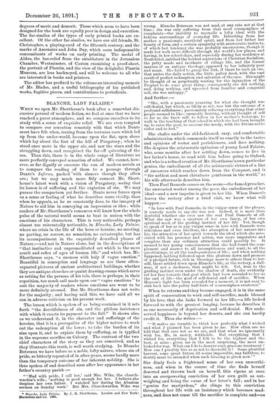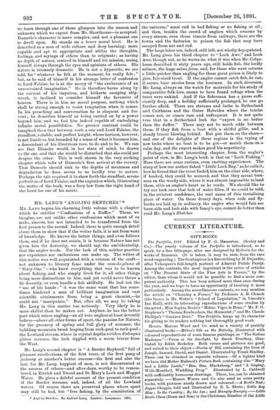BLANCHE, LADY FALAISE.*
WHEN we open Mr. Shorthouse's book after a somewhat dis- cursive perusal of modern fiction, we feel at once that we have
reached a purer atmosphere, and we compose ourselves to its study with a sense of exquisite relief. We are even tempted to compare our sensation remotely with that which Dante must have felt when, issuing from the tortuous cave which led up from the under-world, be came upon the flat, open shore which lay about the foot of the hill of Purgatory; when he
stood once more in the upper air, and saw the stars and the struggling dawn, and recognised the far-off quivering of the
sea. Than this, there is in the whole range of literature no
more perfectly conveyed sensation of relief. We cannot, how- ever, so far dignify or execrate the run of modern novels as to compare the reading of them to a passage through Dante's Inferno, packed with sinners though they often are; but we may much more fitly connect Mr. Short- house's latest work with a vision of Purgatory, seeing that its lesson is of suffering and the expiation of sin. We may pursue the comparison yet further. Dante never forces upon
us a sense or feeling of what he describes more vividly, than when he appeals, as he so constantly does, to the imagery of
Nature to aid him in conveying an impression or idea ; while readers of Mr. Shorthonse's romances will know how the whole pulse of the natural world seems to beat in unison with the
emotions of his characters. This is very noticeable, perhaps almost too reiteratedly noticeable, in Blanche, Lady Falaise, where no crisis in the life of the hero or heroine, no meeting, no parting, no sorrow, no sensation, no catastrophe, but has its accompaniment in the exquisitely described phases of
Nature;—and not in Nature alone, but in the descriptions of that instinctive and unpremeditated art which is the mere result and reflex of ages of human life," and which has, Mr. Shorthonse says, "a oneness with holy if vague emotion."
Beautiful in conception and language as are these often- repeated pictures of ancient architectural buildings, whether they are antique churches or quaint drawing-rooms which serve as setting for the persons of his tale, there is perhaps, in their repetition, too much call made upon our "vague emotions" to suit the major;ty of readers whose emotions are wont to be more definitely aroused. But Mr. Shorthouse does not write
for the majority ; and having said this, we have said all we can in adverse criticism on his present work.
The lesson which is spoken of as being contained in it sets forth "the deceitfulness of sin, and the pitiless insistance with which it exacts its payment to the full." It shows also, as we understand it, in the character and sufferings of the
heroine, that it is a prerogative of the higher nature to work out the redemption of the lower; to take the burden of its sins upon it, and to expiate them by suffering, as is typified
in the supreme sacrifice on Calvary. The contrast of the two chief characters of the story as they are conceived, and as
they illustrate this truth, is well worth studying. In Blanche Boteranx we have before us a noble, lofty nature, whose sin of pride, so bitterly repented of in after-years, seems hardly more than the temporary outcome of her inherent nobility. She is thus spoken of and described soon after her appearance in her father's country parish :—
" Mad with pride, I call her,' said Mrs. Wike, the church- warden's wife- 'nothing is good enough for her. I believe she despises her own father. I watched her during the Absalom sermon on Sunday week.' But Mrs. Churchwarden Wike was
• Blanche, Lady Falaiee. By J. H. Shorthonne. London and New York: liacmillan and Co. LEM.
-- - wrong. Blanche Boteraux was not mad, at any rate not at that time ; she was only suffering from that most commonplace of complaints—the inability to reconcile a lofty ideal with the tedious surroundings of everyday life. Inheriting from her mother a passionate, sacrificial spirit, and from her father her beauty of form, and a certain sympathy with aristocratic instincts, of which last tendency she was probably unconscious, though it made her walk more difficult through the world's low places, and having, in her school-days, and especially during her residence at Neufchiitel, imbibed the boldest aspirations of Christian Socialism, the petty needs and incidents of village life, and the formal maxims of an antique theology, appeared to her infinitely poor and mean. She failed to grasp the link, if there be such an one, that unites the daily action, the little paltry deed, with the vast result of perfect redemption and salvation of the race. She might be thought of as perpetually waiting for the injunction of the Prophet to do some great thing ; consequently she did nothing, and, doing nothing, and uprooted from familiar and congenial soil, she was unhappy."
And further :—
"She, with a passionate yearning for what she thought was self-denial, but which, as likely as not, was but the outcome of a profound selfishness ; passionately refusing everything that other people seemed to like ; earnestly desiring, without thought of self so far as she knew self, to follow in her mother's footsteps, to walk in the teaching of that school in which she had been brought up, to raise the poor, to succour the needy, with the Divine aid to suffer and to feel."
She chafes under the old-fashioned, easy, and comfortable administration which commends itself so exactly to the tastes and opinions of rector and parishioners, and does nothing. She despises the aristocratic optimism of young Lord Falaise, who, some months after her settling down, comes to live in her father's house, to read with him before going to Oxford, and who is a refined creation of Mr. Shorthouse's own particular genius, the embodiment of all the aristocratic virtues of a line of ancestors which reaches down from the Conquest, and is "the noblest and most chivalrous gentleman in the world," as his wife afterwards describes him.
Then Paul Damerle comes on the scene—the famed preacher, the unwearied worker among the poor, the embodiment of her ideal—and a new impulse is given to her life. When Damerle leaves the rectory after a brief visit, we know what will happen :—
"In love with Paul Damerle, in the vulgar sense of the phrase, it scarcely needs to say she was not. Indeed, it is more than doubtful whether she ever saw the real Paul Damerle at all. What she saw was a creature of her own fancy, of her own spiritual need, of the guiding instinct of her life. Yet, though to speak of her as in any vulgar sense in love with Damerle were ridiculous and even libelous, the absorption of her nature into his, the attraction of her spirit towards the ideal which she asso- ciated with his presence and action, was more imperative and complete than any ordinary attraction could possibly be. It seemed to her young consciousness that she had found the com- plement and answer to all incompleteness and want, to all the questionings, to all the inadequateness of life ; and when nothing happened, nothing followed upon this glorious dawn and promise of a pledged future, rich in blessings more to others than to her- self, there settled down upon Blanche's life, at the rectory, a dull- ness, if not a darkness, that might be felt. Yet, true to the guiding instinct even under the shadow of death, she evidently set her face towards that goal which had been revealed to her as the end of life—the goal of self-denial and of sacrifice. When Heaven's light has been revealed for a moment, it is not easy to sink back into the paltry half-tints of commonplace existence."
When he returns and they become engaged, it is in the same spirit of consecration to work and self-sacrifice, made blessed by his love, that she looks forward to her life,—a life looked forward to with the greatest longing, because he describes it as one necessarily of deprivation and self-denial. Her unde- served happiness is beyond her deserts, and she can hardly credit it. Thus she writes :— " 'It makes me tremble to think how perfectly what / wished and what / planned has been given to me. How often are we told that God sees not as we see, and that what we ignorantly wish for, He, in mercy, withholds. But everything that I wished for, everything that I felt to be the highest and the best, is mine : given me in the most surprising, the most un- looked-for way. What can I do to deserve such gracious treatment ? How can I possibly live so as not to discredit it ? Some plentiful harvest, Borne great future (it seems impossible, nay faithless, to doubt) must be intended when such blessing is given now.' "
She dimly feels a frightened sense of her own unworthi- ness, and when in the course of time she finds herself deserted and thrown back on herself, this ripens at once into an overpowering conviction of her own guilt as out- weighing and being the cause of her lover's fall ; and in her "genius for martyrdom," she clings to this conviction throughout her life with an insistancy which becomes mad- ness, and does not cease till the sacrifice is complete and—as we learn through one of those glimpses into the unseen and unknown which we expect from Mr. Shorthouse—is accepted. Damerle's character is more complex, and not a pleasant one to dwell upon. He stands on a lower moral level. He is described as a man of wide culture and deep learning; more capable and apt to appropriate and utilise the thoughts, feelings, and sayings of others than to originate ; as having no depth of nature, centred in himself and his mission, seeing himself always through the eyes and opinions of others. His nature is intensely dramatic. He is not a hypocrite, we are told, for" whatever he felt at the moment, he really felt ; " but, as he said of himself in his strange letter of confession to Lord Falaise, he is at the mercy of "the exuberance of an unrestrained imagination." He is therefore borne along by the current of his impulses, and hitherto escaping ship- wreck, is inclined to consider himself the favourite of heaven. There is in him no moral purpose, nothing which shall be strong enough to resist temptation when it comes. In his preaching and conversation he is eloquent and fer- vent; he describes himself as being carried on by a power beyond him, and we feel him indeed capable of embodying infinite moral possibilities. No greater contrast could be imagined than that between such a one and Lord Falaise, the steadfast, reliable, and perfect knight, whose horizon, however, is not limitless, but bounded by a sense of what it becomes him, a descendant of his illustrious race, to do and to be. We can see that Blanche would, in her state of mind, be drawn to the one, and that she would be disturbed that she could not despise the other. This is well shown in the very striking chapter which tells of Damerle's first arrival at the rectory. That Damerle should sink to the depths of meanness and degradation he does, seems to us hardly true to nature. Perhaps the tale required it to show forth the steadfast, serene perfection of Lord Falaise, and the expiation which, illustrating the motto of the book, was a fiery law from the right hand of the Lord for one of his saints.



































 Previous page
Previous page